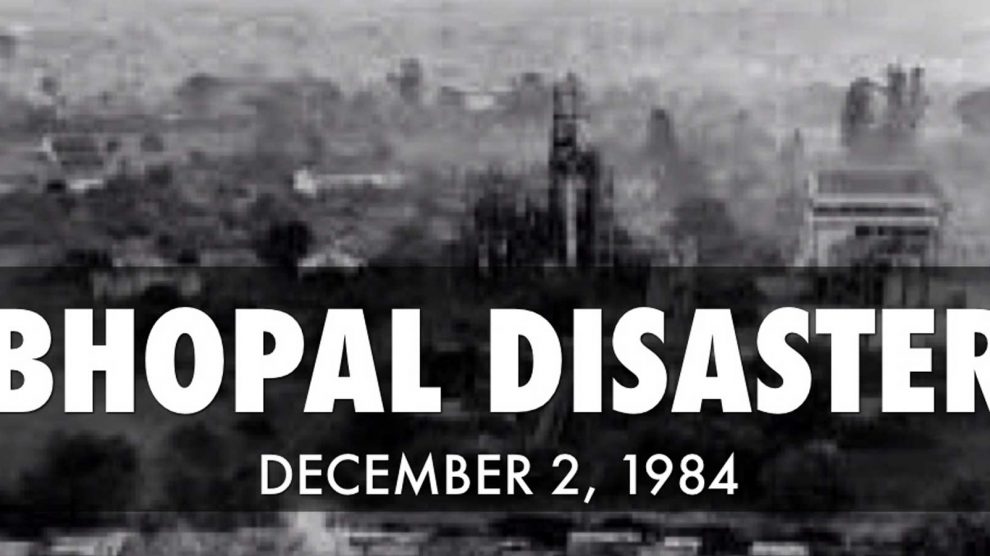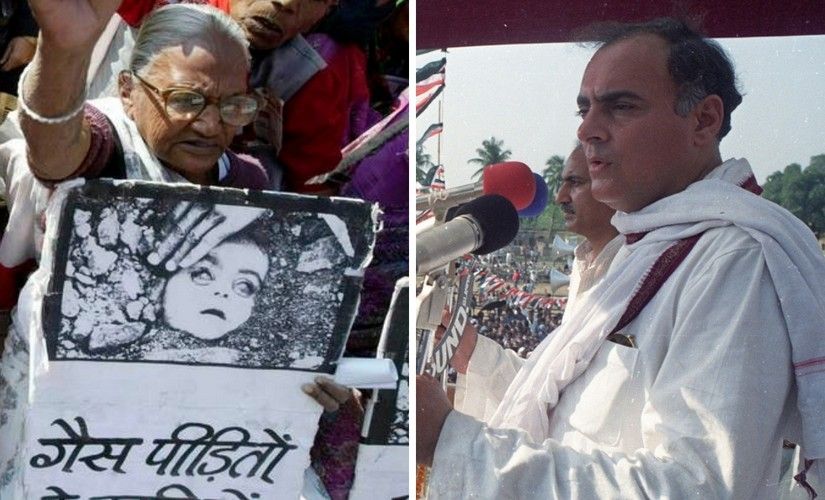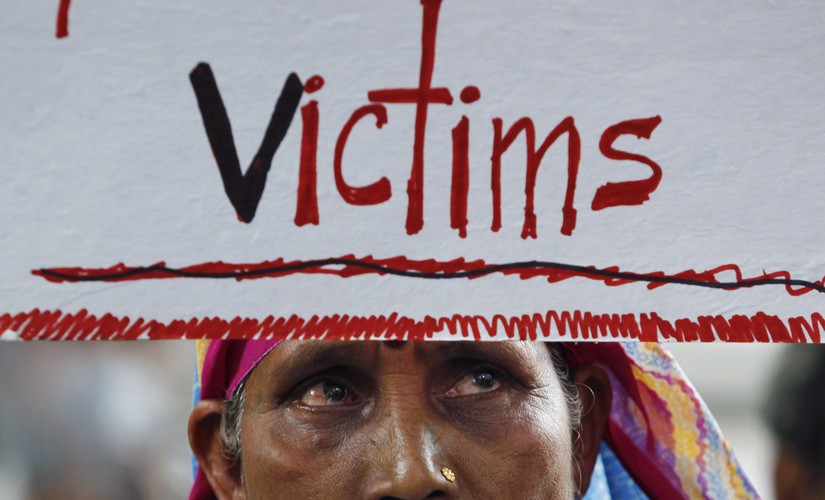
Editor’s Note:
More than 700 documents accessed from former prime minister Rajiv Gandhi’s office reveal how horrible relief and rehabilitation measures by the authorities, and a company determined to hide the truth led to more deaths in the aftermath of the Bhopal gas tragedy. This three-part series uncovers how a dysfunctional administration at the state and Centre failed to contain the crisis 34 years ago, and how it’s taking lives even today.
Curtsy, Yatish Yadav
New Delhi:
Homi JH Taleyarkhan was serving as Indian Ambassador to Italy when the poisonous gas leak caused mayhem in the city of lakes. His letter marked as ‘important’ in the Prime Minister’s Office (PMO) file no (17/2049/A/86-III) reveals that Italian government, which had faced similar kind of disaster at Seveso near Milan in 1976, had rushed to Taleyarkhan offering help to deal with the tragedy but the Indian government appeared to be ‘not interested’. This is evident from Taleyarkhan’s letter to Sarla Grewal, then secretary to former prime minister Rajiv Gandhi. Taleyarkhan and Grewal are no more. She died in 2002 while Taleyarkhan passed away in June 1998.
“As soon as the Italians came to know about our Bhopal tragedy, they had come rushing to me in Rome as the Ambassador of India to explain all the remedial measures including the latest technology that they had applied at the time of a similar disaster they had suffered at Seveso near Milan in 1976. They had taken me to see the area and the steps they had taken. After the round they had organised a full-fledged conference to explain everything and had given me special video cassette and colour albums with commentary and captions specially done for us in English and had offered all help possible without any obligation whatsoever and purely out of love for our country and our people. I had sent it to our ministry concerned through the Ministry of External Affairs, but in spite of reminders I had heard nothing further,” Taleyarkhan wrote in the letter dated 28 October, 1986.
The date is significant because it was already 22-months since the tragic incident had happened in Bhopal and the Indian administration was scrambling to ensure remedial measures. Taleyarkhan had also sent a note on the Italian rehabilitation plan just a month after Bhopal tragedy and had eveb admitted it ‘most impressive action’ on the record.

The Seveso disaster in the chemical manufacturing plant had caused long-term health problems for 37,000 people. The Italians had divided the area in three zones, on the basis of gas leakage impact. The first zone called as zone ‘A’ which comprises of the area where the multinational chemical company plant was located was virtually razed to the ground, completely demolishing the buildings, the plant and machinery. The Italian government had offered Taleyarkhan that they were ready to provide assistance to India on sampling methods for soil and water contamination evaluation, clean up of designs, health monitoring of population and workers, safe disposal of hazardous waste, legal aspects like indemnification, compensation and visit of Italian experts to Bhopal.
Ignoring the cost of human existence
The PMO acknowledged Taleyarkhan letter and Italian offer only in November 1986 when JN Chaubey, a director-level officer sent an internal note to the additional secretary handling Bhopal issue. Taleyarkhan had by the time returned to India and had joined the minorities commission as a member.
The PMO note (4715) dated 4 November, 1986 said, “JH Taleyarkhan, member, Minorities Commission, has written to (additional) secretary regarding a note he had sent to the Ministry of External Affairs when he was the Indian Ambassador in Italy. His note deals with his visit to an area called Seveso near Milan, Italy, in February 1985 where relief and rehabilitation measures had been taken by Italians after a chemical disaster at Seveso in 1976. The note describes how the rehabilitation measures were taken in this area. The Seveso lesson could be very relevant to Bhopal case. If approved, the report from Taleyarkhan will be sent to the Department of Chemicals and Petro-Chemicals with a request that the Italian experience should be utilised appropriately.”
Six days later the Taleyarkhan’s note was sent to DV Kapur, then secretary, Department of Chemicals, through PMO UO No 17(2049) to examine the Italian’s offer.
There is nothing in the files to suggest that the administration even after a massive costly delay took any initiative to accept the Italian government’s offer. It also appears there was serious disconnect between the government assessment and ground reality brought to the notice by the civil society organisations at a time when the Indian government and Union Carbide were fighting the legal battle.
Non-profit organisations like Association For Protection of Democratic Rights had alleged that gas victims were yet to get any justice while a working group headed by BJ Heerjee, then additional secretary in the home ministry was satisfied with the progress on the ground. This group comprising of bureaucrats was set up by the government to assess the relief and rehabilitation measures taken by the state government. The group, which made a trip to Bhopal on 5-6 September, 1986, had observed that medical services were substantially improved and persons requiring medical attention had easier access to facilities.
“By now, 2,233 persons have been identified as dead due to gas leak. In January 1986, the number stood at 1,784. By the end of September 1986, the state government have made payment of Rs 10,000 for each of the 1,853 dead persons. The state government had included drainage, paving of roads, street lights and drinking water outlets in affected colonies in their environmental improvement programmes. After a visit to one of the badly affected areas, the group felt that the programme has to be considerably stepped up. It is necessary that this work is completed as quickly as possible because of many other implications apart from the benefit to the inhabitants,” the report had said.
A draft report prepared by the Ministry of Home Affairs said: “It is indeed regrettable that the profound help from (a) foreign government and international agencies did not materialise at all.”
For Union Carbide, it was business as usual
Despite the massive disaster, Union Carbide was not considered a pariah in the government corridors. A civil society group, International Coalition For Justice in Bhopal (ICJIB), formed in Australia for justice to gas victims had accused the Rajiv Gandhi government for entering into commercial transactions with Union Carbide ignoring the suffering of victims.
In a letter, dated 3 December, 1986, the ICJIB said, “It is reported that in 1985, after the occurrence of the Bhopal disaster, Union Carbide India Limited (UCIL) was awarded a Rs 100 million (approximately $8 million) contract by the Madhya Pradesh government for the manufacture/ distribution of condoms.”
The letter triggered an emergency meeting in the PMO to discuss the allegations. The internal note dated 9 February, 1987, and signed by Chaubey admitted that UCIL was indeed doing business in India after Bhopal disaster but the contract was signed prior to the tragedy.
“This aspect was checked up with the (then) additional secretary, family welfare in the Department of Health who informs us that under their programme of social marketing, they were distributing condoms to 10 major companies in the country, with largest retail outlets, so that their network would be utilised for marketing condoms in rural areas. This arrangement with UCIL was reached prior to the Bhopal case. This arrangement is still continuing and UCIL outlets are selling condoms in Bihar, Uttar Pradesh, Jammu and Kashmir but not in Madhya Pradesh,” the note said.
A day later, GK Arora, then additional secretary in the PMO, told the officials that they need to explore options to move UCIL share in condom distribution to some other firms.
“The arrangement existing between the Ministry of Health and the Union Carbide for social marketing of contraceptives should be examined afresh. Efforts should be made to get some other companies including multi-nationals such as Hindustan Lever, ITC, etc, to pick up UCIL’s share,” GK Arora wrote.
Relief eludes survivors

Thirty-four years later, nothing seems to have changed for the survivors of the Bhopal gas tragedy. Documents obtained by Bhopal Group for Information and Action (BGIA) under the Right To Information Act shows that funds meant for providing employment to survivors and their children have been diverted to build drains, roads and parks. Similarly, BGIA said, almost one-third of the funds meant for the housing of residents in the vicinity of the Union Carbide factory is also being diverted for the same purpose.
The Central Government in 2010 had approved a new action plan with Rs 272.75 crores for rehabilitation projects comprising of economic rehabilitation as well as the construction of houses for residents near Union Carbide factory in Bhopal. Documents obtained from the Department of Bhopal Gas Tragedy Relief and Rehabilitation shows the lackadaisical approach of the state and the Central Government. Rachna Dhingra of the BGIA expressed concern about the complicity of the Central Government in the misutilisation and misappropriation of funds meant for Bhopal gas tragedy survivors.
“In 2014, we sent hard evidence of misappropriation of Rs 18 Crores meant for economic rehabilitation of survivors to the CBI and to the Ministry of Chemicals that had provided the funds. No action has been taken against the known culprits till date. Documents show that in March this year the Ministry of Chemicals approved diverting of funds meant for survivors after objecting to it for three years,” she said.
The documents show that till December 2017, only Rs 129.50 crore was spent despite the lapse of eight years. As far as economic rehabilitation was concerned, Rs 104 crore was allocated in 2010 but only Rs 18.13 crore was spent. Minutes of Meeting of the Ministry of Chemical and Fertilizers with principal secretary, Bhopal Gas Tragedy Relief and Rehabilitation, Madhya Pradesh, shows the decision to divert unutilised funds were taken in March 2018.
“The balance unspent amount of Rs 14 crore under Social Rehabilitation for Construction of Houses to (Bhopal) gas (tragedy) victims and the amount of Rs 60.75 crore out of Rs 85.87 crore under Economic Rehabilitation (total of Rs 74.75 crore) may be spent for social and environmental facilities (construction of roads, khadanja, drainage, street lighting, etc) in the gas affected areas with the approval of the Cabinet,” documents revealed.
There are still loopholes in the disbursement of ex-gratia to the victims after more than three decades. Notes from of another meeting held in September reveal a shoddy state of affairs: “The Cabinet had sanctioned the disbursement of ex-gratia to 5,295 death cases in the year 2010. Thereafter, it was detected during scrutiny of records that 30 cases which awarded compensation under death category had erroneously been left out from the list of 5,295. The in-charge registrar brought out a total number of 35,455 cases sanctioned under the category of temporary partial disablement resulting in reduced capacity to earn livelihood; 34,229 cases were decided till July 2017.”



